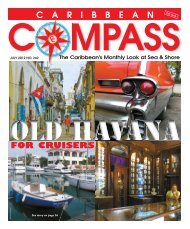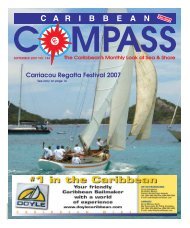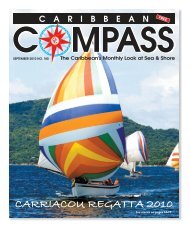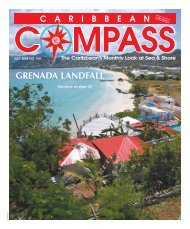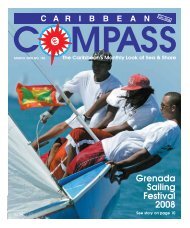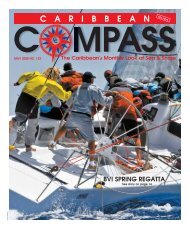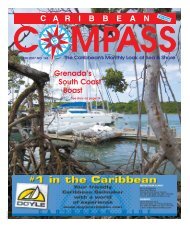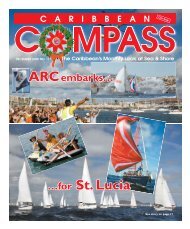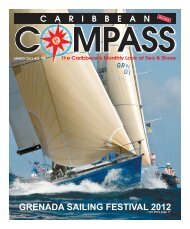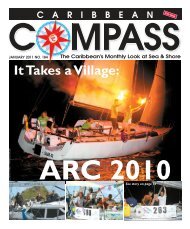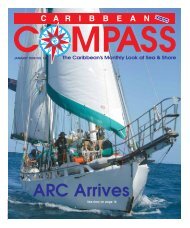You also want an ePaper? Increase the reach of your titles
YUMPU automatically turns print PDFs into web optimized ePapers that Google loves.
After nearly 12 years of living aboard a yacht, mostly<br />
spent at anchor, I have come to expect the question:<br />
“Why don’t you move ashore?” or the more directly<br />
expressed, ”How can you bear to live on board?”<br />
The answers to these questions are never simple,<br />
and vary greatly from one cruiser to the next, but after<br />
some thought, here are a few of the many reasons I<br />
chose, and continue, to live on a boat.<br />
For many landlubbers, the thought of living on a<br />
rocking boat is horrible, but after many years of<br />
bouncing bunks, we genuinely find it difficult to sleep<br />
on a bed that is totally still. My husband, Niels, and I<br />
love being rocked to sleep. There are times when being<br />
thrown up and down is a nuisance, such as when trying<br />
to locate a bolt under the engine while hanging by<br />
your toes with your head in the bilge, but generally,<br />
after so many years, we hardly notice the movement.<br />
Now rolling from side to side is another issue altogether,<br />
but one soon learns a few tricks to keep from<br />
falling off the bed. There is the spread eagle position<br />
(not realistic when two share the bunk) or you can<br />
jam yourself in with cushions all round (rather hot);<br />
there is the knock-yourself-out-with-alcohol method<br />
(not foolproof because you may find yourself unconsciously<br />
levitating and landing on the floor), and the<br />
last one — which genuinely works: do it enough and<br />
you get used to it. Of course adjustment takes a little<br />
longer when pounding to windward, with gravity pulling<br />
you sideways as you crab your way across the<br />
deck or up or down the companionway, but eventually<br />
your body, like the smart computer it is, anticipates<br />
movement better and better. Just take some<br />
tips from the lilting, lurching Sailor’s Dance at<br />
Trinidad’s traditional Carnival.<br />
FOR SALE<br />
GLACIER BAY 34/70<br />
powered by two 250 HP Suzuki outboards<br />
based in Port St. Charles Barbados.<br />
Professionally maintained from new.<br />
Very clean, in excellent condition all systems working.<br />
ASKING US$125 US$125,000 000<br />
Contact Bizzy Williams Tel: 246-262-2000<br />
or email: bizzy@williamsind.com.bb<br />
WHAT’S ON MY MIND<br />
Love<br />
to Live<br />
Aboard<br />
by Ruth Lund<br />
The second reason folk give for finding our choice of<br />
habitat crazy is the lack of space aboard a boat. We<br />
started with a 37-foot boat, and then moved on to a<br />
43-foot boat, which did make a difference. We no longer<br />
“bump bums” as we try to move around the saloon<br />
or fit ourselves into a narrow bunk like two pieces of<br />
a puzzle.<br />
Home sweet home. When you’re a<br />
cruiser, you can take it with you<br />
When selecting our first yacht, we had two basic<br />
criteria that ruled out many options. Niels, 6’ 4” tall,<br />
lay down on all the bunks to see if they were long<br />
enough (seven feet was a minimum) and stood up in all<br />
the cabins to test the headroom, while I sat on all the<br />
PICK UP!<br />
Ahoy, <strong>Compass</strong> Readers! When in Curaçao, pick up your free monthly copy of<br />
the <strong>Caribbean</strong> <strong>Compass</strong> at any of these locations (advertisers in this issue<br />
appear in bold):<br />
CARACASBAAIWEG<br />
Budget Marine Curaçao<br />
PLETTERIJWEG<br />
Budget Marine Curaçao<br />
Curaçao Marine Service<br />
SPANISH WATER<br />
Asiento Yacht Club<br />
Curacao Yacht Club<br />
Kimakalki Marina<br />
toilet seats to make sure they were wide enough for my<br />
broad beam. It is often the way space is allocated on a<br />
yacht that gives one a good or bad feeling. Some sizeable<br />
modern yachts, which are jam-packed with cupboards<br />
and lockers from floor to ceiling make me feel<br />
claustrophobically closed in, while our less storageefficient,<br />
old-fashioned layout and large foredeck gives<br />
more breathing space, both literally and figuratively.<br />
However, even when we were on a smaller boat, our<br />
backyard was bigger than anything I ever enjoyed on<br />
land. Sitting on deck, our view stretches to infinity. No<br />
crowded buildings and streets close us in. This is what<br />
we look forward to every single day. If location is all,<br />
we are sitting on the best real estate in the world.<br />
When recently asked, “What happens when the two of<br />
you have a bad fight and you can’t get away from each<br />
other?” Niels diplomatically replied, “We don’t have<br />
really bad fights”, but the truth is, we actually get along<br />
better on board than we did living ashore. Stressful factors<br />
are far fewer. There are no demanding relatives and<br />
if there are irritating neighbours, we can always lift the<br />
anchor and move elsewhere. Because we both love to<br />
sail, we get along best at sea and especially when making<br />
an ocean passage. Unfortunately this is not the case<br />
for all cruising couples, who sometimes find that not<br />
being able to escape from their spouse, or seek their<br />
usual friends and family support systems, causes problems.<br />
For us, being together so much has brought us<br />
closer and made us more in tune with each other.<br />
“Don’t you miss having access to all the mod cons<br />
— large house, fancy car, big TV, washing machine and<br />
drier, spacious deepfreeze, water and electricity on tap,<br />
etcetera?” Our answer to this is — not really. When we<br />
packed up our house and got rid of all our furniture and<br />
other possessions, I felt an amazing sense of relief. So<br />
much of what we had was unnecessary, but still needed<br />
to be cleaned, cared for, stored and insured. On the boat<br />
we live very simply, with far fewer clothes, complicated<br />
gadgets and “stuff”. Besides anything else, there is just<br />
not the space to collect extraneous items. One cruiser<br />
said that if something had not been used for a year, they<br />
threw it off the boat — not a bad rule for living without<br />
waste. We get a kick out of generating our own power<br />
via wind and sun, collecting our own water, fixing and<br />
maintaining our own boat, making our own entertainment<br />
and selecting our own waypoints without depending<br />
on other people, organizations or systems.<br />
On watch at night, alone with my thoughts and<br />
myriad stars, a phosphorescent wake marking our<br />
slow but steady passage, I feel comfortable knowing I<br />
can depend utterly on my partner, asleep down below.<br />
Making landfall after a stormy, exhausting passage<br />
gives me a special sense of achievement, having met<br />
once again the physical and mental challenge of the<br />
sea. When I curl up in the cockpit with a book and a<br />
companionable cat, the sound of fish jumping and<br />
birds calling all around me, fresh sea air and warm<br />
sun caressing me, I am conscious of enjoying some of<br />
the very best days of my life. Best of all, while we live<br />
aboard, our dreams of exciting adventures and unusual<br />
destinations can be realized by merely lifting the<br />
anchor, setting the sails and plotting a new course.<br />
JULY 2010 CARIBBEAN COMPASS PAGE 41




